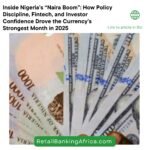The naira strengthened across both the official and parallel foreign exchange markets in the first week of September 2025, extending the steady gains recorded at the close of August. The performance marks one of the strongest showings for the local currency in recent months, reflecting renewed confidence driven by diaspora remittances, foreign portfolio inflows, and strategic currency agreements.
In the parallel market, the naira opened the week at ₦1,539/$1 on Monday, September 1, held steady on Tuesday, firmed slightly to ₦1,538/$1 midweek, and closed stronger at ₦1,535/$1 on Thursday. Compared with early August, when the naira slipped as low as ₦1,570/$1, the recent appreciation underscores a notable turnaround.
The official market mirrored this momentum. The currency appreciated consistently, starting at ₦1,527.9/$1 on Monday before closing the week at ₦1,511.5/$1 on Thursday, September 4. This was a significant improvement over early August levels, which hovered between ₦1,533/$1 and ₦1,537/$1.
Analysts attribute this strengthening trend to several interlinked factors. Diaspora remittances surged by 200% in recent months to $600 million, according to Central Bank of Nigeria (CBN) Governor Olayemi Cardoso, providing critical foreign exchange liquidity. Similarly, Nigeria’s external reserves rose to $41.3 billion in August, bolstering the CBN’s ability to support the currency.
Investor sentiment is also improving. Offshore portfolio inflows increased to $1.7 billion in August, up from $1.5 billion in June, reflecting cautious optimism as carry trade opportunities and stable global macroeconomic conditions favor Nigeria. Abuja-based analyst Gideon Agba noted that such currency stability tends to reassure investors, paving the way for additional inflows.
At the trading floor level, forex dealers highlight the China–Nigeria currency swap arrangement as another stabilizing factor. By facilitating direct yuan–naira settlements, the deal reduces demand for U.S. dollars in Sino-Nigerian trade, easing pressure on the local currency.
While challenges remain, particularly around inflationary pressures and structural imbalances in Nigeria’s forex ecosystem, the first week of September suggests that the coordinated push—via remittances, reserves management, and investor engagement—is beginning to yield results. Market watchers say sustained stability could create a virtuous cycle, attracting further inflows and deepening confidence in Nigeria’s financial system.











